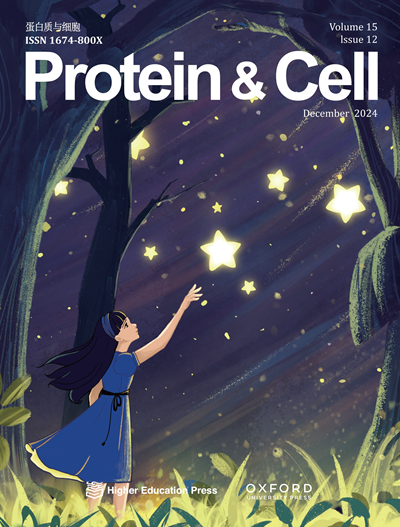谷氨酰胺信号特异性激活c-Myc和Mcl-1促进癌细胞增殖和存活。
IF 12.8
1区 生物学
Q1 CELL BIOLOGY
引用次数: 0
摘要
谷氨酰胺提供碳和氮来支持癌细胞的增殖。然而,癌细胞特别依赖谷氨酰胺的确切原因尚不清楚。在这项研究中,我们报道了谷氨酰胺调节肿瘤抑制因子F-box和WD重复结构域7 (FBW7)来促进癌细胞的增殖和生存。具体来说,FBW7的7个底物招募WD重复序列中的第6个赖氨酸604 (K604)通过谷氨酰基tRNA合成酶(QARS)进行谷氨酰化(Gln-K604)。Gln-K604抑制scffbw7介导的c-Myc和Mcl-1降解,增强谷氨酰胺利用,并通过激活c-Myc刺激核苷酸和DNA的生物合成。此外,Gln-K604通过激活Mcl-1促进细胞凋亡抵抗。相反,SIRT1去谷氨酰胺化Gln-K604,从而逆转其作用。缺乏Gln-K604的癌细胞表现出c-Myc和Mcl-1的过度表达,并对化疗诱导的细胞凋亡表现出耐药性。沉默这些细胞中的c-MYC和MCL-1使它们对化疗敏感。这些发现表明谷氨酰胺介导的Gln-K604信号是癌症进展的关键驱动因素,并提出了基于不同Gln-K604状态的靶向癌症治疗的潜在策略。本文章由计算机程序翻译,如有差异,请以英文原文为准。
Glutamine signaling specifically activates c-Myc and Mcl-1 to Facilitate cancer cell proliferation and survival.
Glutamine provides carbon and nitrogen to support the proliferation of cancer cells. However, the precise reason why cancer cells are particularly dependent on glutamine remains unclear. In this study, we report that glutamine modulates the tumor suppressor F-box and WD repeat domain-containing 7 (FBW7) to promote cancer cell proliferation and survival. Specifically, lysine 604 (K604) in the sixth of the seven substrate-recruiting WD repeats of FBW7 undergoes glutaminylation (Gln-K604) by glutaminyl tRNA synthetase (QARS). Gln-K604 inhibits SCFFBW7-mediated degradation of c-Myc and Mcl-1, enhances glutamine utilization, and stimulates nucleotide and DNA biosynthesis through the activation of c-Myc. Additionally, Gln-K604 promotes resistance to apoptosis by activating Mcl-1. In contrast, SIRT1 deglutaminylates Gln-K604, thereby reversing its effects. Cancer cells lacking Gln-K604 exhibit overexpression of c-Myc and Mcl-1 and display resistance to chemotherapy-induced apoptosis. Silencing both c-MYC and MCL-1 in these cells sensitizes them to chemotherapy. These findings indicate that the glutamine-mediated signal via Gln-K604 is a key driver of cancer progression and suggest potential strategies for targeted cancer therapies based on varying Gln-K604 status.
求助全文
通过发布文献求助,成功后即可免费获取论文全文。
去求助
来源期刊

Protein & Cell
CELL BIOLOGY-
CiteScore
24.00
自引率
0.90%
发文量
1029
审稿时长
6-12 weeks
期刊介绍:
Protein & Cell is a monthly, peer-reviewed, open-access journal focusing on multidisciplinary aspects of biology and biomedicine, with a primary emphasis on protein and cell research. It publishes original research articles, reviews, and commentaries across various fields including biochemistry, biophysics, cell biology, genetics, immunology, microbiology, molecular biology, neuroscience, oncology, protein science, structural biology, and translational medicine. The journal also features content on research policies, funding trends in China, and serves as a platform for academic exchange among life science researchers.
 求助内容:
求助内容: 应助结果提醒方式:
应助结果提醒方式:


